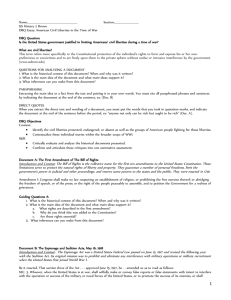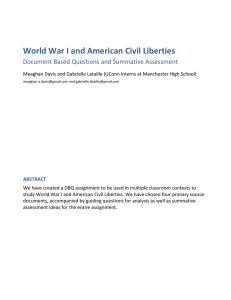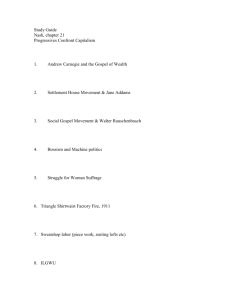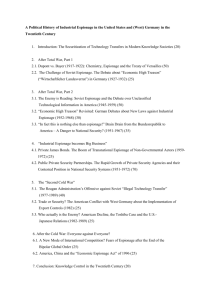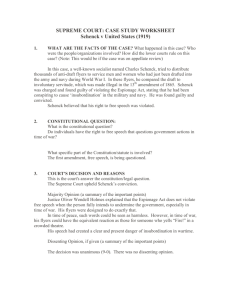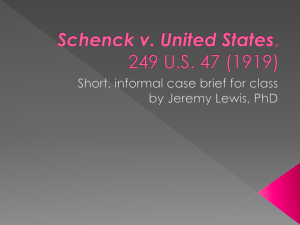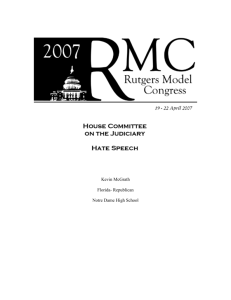Name: DBQ Essay: American Civil Liberties in the Time of War DBQ
advertisement
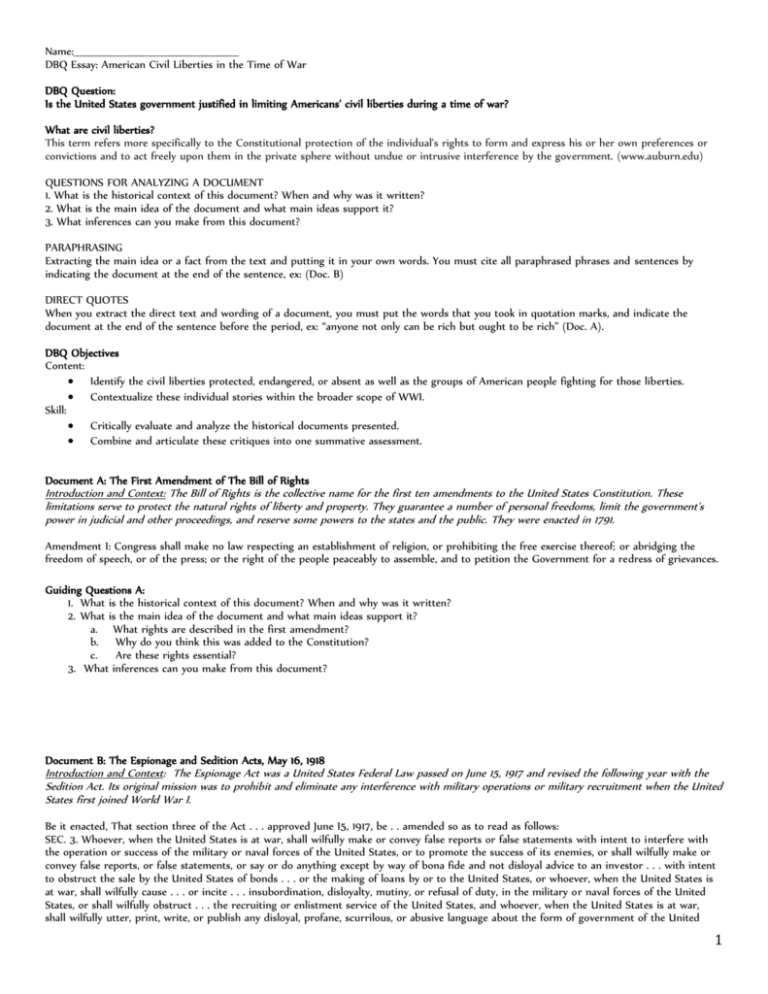
Name:_____________________________________________ DBQ Essay: American Civil Liberties in the Time of War DBQ Question: Is the United States government justified in limiting Americans’ civil liberties during a time of war? What are civil liberties? This term refers more specifically to the Constitutional protection of the individual's rights to form and express his or her own preferences or convictions and to act freely upon them in the private sphere without undue or intrusive interference by the government. (www.auburn.edu) QUESTIONS FOR ANALYZING A DOCUMENT 1. What is the historical context of this document? When and why was it written? 2. What is the main idea of the document and what main ideas support it? 3. What inferences can you make from this document? PARAPHRASING Extracting the main idea or a fact from the text and putting it in your own words. You must cite all paraphrased phrases and sentences by indicating the document at the end of the sentence, ex: (Doc. B) DIRECT QUOTES When you extract the direct text and wording of a document, you must put the words that you took in quotation marks, and indicate the document at the end of the sentence before the period, ex: “anyone not only can be rich but ought to be rich” (Doc. A). DBQ Objectives Content: Identify the civil liberties protected, endangered, or absent as well as the groups of American people fighting for those liberties. Contextualize these individual stories within the broader scope of WWI. Skill: Critically evaluate and analyze the historical documents presented. Combine and articulate these critiques into one summative assessment. Document A: The First Amendment of The Bill of Rights Introduction and Context: The Bill of Rights is the collective name for the first ten amendments to the United States Constitution. These limitations serve to protect the natural rights of liberty and property. They guarantee a number of personal freedoms, limit the government's power in judicial and other proceedings, and reserve some powers to the states and the public. They were enacted in 1791. Amendment I: Congress shall make no law respecting an establishment of religion, or prohibiting the free exercise thereof; or abridging the freedom of speech, or of the press; or the right of the people peaceably to assemble, and to petition the Government for a redress of grievances. Guiding Questions A: 1. What is the historical context of this document? When and why was it written? 2. What is the main idea of the document and what main ideas support it? a. What rights are described in the first amendment? b. Why do you think this was added to the Constitution? c. Are these rights essential? 3. What inferences can you make from this document? Document B: The Espionage and Sedition Acts, May 16, 1918 Introduction and Context: The Espionage Act was a United States Federal Law passed on June 15, 1917 and revised the following year with the Sedition Act. Its original mission was to prohibit and eliminate any interference with military operations or military recruitment when the United States first joined World War I. Be it enacted, That section three of the Act . . . approved June I5, 1917, be . . amended so as to read as follows: SEC. 3. Whoever, when the United States is at war, shall wilfully make or convey false reports or false statements with intent to interfere with the operation or success of the military or naval forces of the United States, or to promote the success of its enemies, or shall wilfully make or convey false reports, or false statements, or say or do anything except by way of bona fide and not disloyal advice to an investor . . . with intent to obstruct the sale by the United States of bonds . . . or the making of loans by or to the United States, or whoever, when the United States is at war, shall wilfully cause . . . or incite . . . insubordination, disloyalty, mutiny, or refusal of duty, in the military or naval forces of the United States, or shall wilfully obstruct . . . the recruiting or enlistment service of the United States, and whoever, when the United States is at war, shall wilfully utter, print, write, or publish any disloyal, profane, scurrilous, or abusive language about the form of government of the United 1 States, or the Constitution of the United States, or the military or naval forces of the United States, or the flag . . . or the uniform of the Army or Navy of the United States, or any language intended to bring the form of government . . . or the Constitution . . . or the military or naval forces . . . or the flag . . . of the United States into contempt, scorn, contumely, or disrepute . . . or shall wilfully display the flag of any foreign enemy, or shall wilfully . . . urge, incite, or advocate any curtailment of production in this country of any thing or things . . . necessary or essential to the prosecution of the war . . . and whoever shall wilfully advocate, teach, defend, or suggest the doing of any of the acts or things in this section enumerated and whoever shall by word or act support or favor the cause of any country with which the United States is at war or by word or act oppose the cause of the United States therein, shall be punished by a fine of not more than $10,000 or imprisonment for not more than twenty years, or both.... Guiding Questions B: 1. What is the historical context of this document? When and why was it written? 2. What is the main idea of the document and what main ideas support it? a. What is the Espionage Act disallowing Americans to do? b. What is the consequence of Americans violating the Espionage Act? c. Why do you think the US government enacted the Espionage Act? 3. What inferences can you make from this document? Document C: Sedition Act political cartoon by W.A. Rogers, 1918. Guiding Questions C: 1. What is the historical context of this document? When and why was it written? 2. What is the main idea of the document and what main ideas support it? a. What is the point of view of the cartoonist? b. What details in the cartoon make you think this? 3. What inferences can you make from this document? Document D: Schenck Pamphlet Introduction and Context: Charles Schenck was a Socialist who printed and distributed thousands of anti-war pamphlets in 1917 and 1918 opposing the war. The excerpt above comes from one of his pamphlets. Assert Your Rights The Socialist Party says that any individual or officers of the law intrusted with the administration of conscription regulations violate the provisions of the United States Constitution, the supreme law of the land, when they refuse to recognize your right to assert your opposition to the draft. […] If you do not assert and support your rights you are helping to "deny or disparage rights" which it is the solemn duty of all citizens and residents of the United States to retain. In lending tacit or silent consent to the conscription law, in neglecting to assert your rights, you are (whether knowingly or not) helping to condone and support a most infamous and insidious conspiracy to abridge and destroy the sacred and cherished rights of a free people. You are a citizen: not a subject! You delegate your power to the officers of the law to be used for your good and welfare, not against you. 2 They are your servants; not your masters. Their wages come from the expenses of government which you pay. Will you allow them to unjustly rule you? No power was delegated to send our citizens away to foreign shores to shoot up the people of other lands, no matter what may be their internal or international disputes. To draw this country into the horrors of the present war in Europe, to force the youth of our land into the shambles and bloody trenches of war crazy nations, would be a crime the magnitude of which defies description. Words could not express the condemnation such cold-blooded ruthlessness deserves… Guiding Questions D: 1. What is the historical context of this document? When and why was it written? 2. What is the main idea of the document and what main ideas support it? a. What is the conscription? b. Why does Schenk object to it? c. How does he get his message out? 3. What inferences can you make from this document? Document E: Schenck v. United States Introduction and Context: In 1919 this case went to the Supreme Court. Mr. JUSTICE HOLMES delivered the opinion of the court about Schenck’s first amendment rights and his protests against World War I. Schenck was found guilty of violating the Espionage and Sedition Acts. …This is an indictment in three counts. The first charges a conspiracy to violate the Espionage Act of June 15, 1917, c. 30, § 3, 40 Stat. 217, 219, by causing and attempting to cause insubordination, &c., in the military and naval forces of the United States, and to obstruct the recruiting and enlistment service of the United States, when the United States was at war with the German Empire, to-wit, that the defendants wilfully conspired to have printed and circulated to men who had been called and accepted for military service under the Act of May 18, 1917, a document set forth and alleged to be calculated to cause such insubordination and obstruction. … The second count alleges a conspiracy to commit an offence against the United States, to-wit, to use the mails for the transmission of matter declared to be non-mailable by Title XII, § 2 of the Act of June 15, 1917, to-wit, the above mentioned document, with an averment of the same overt acts. The third count charges an unlawful use of the mails for the transmission of the same matter and otherwise as above. The defendants were found guilty on all the counts. They set up the First Amendment to the Constitution forbidding Congress to make any law abridging the freedom of speech, or of the press, and bringing the case here on that ground have argued some other points also of which we must dispose. […] But it is said, suppose that that was the tendency of this circular, it is protected by the First Amendment to the Constitution. Two of the strongest expressions are said to be quoted respectively from well known public men. It well may be that the prohibition of laws abridging the freedom of speech is not confined to previous restraints, although to prevent them may have been the main purpose, as intimated in Patterson v. Colorado, 205 U. S. 454, 205 U. S. 462. We admit that, in many places and in ordinary times, the defendants, in saying all that was said in the circular, would have been within their constitutional rights. But the character of every act depends upon the circumstances in which it is done. Aikens v. Wisconsin, 195 U. S. 194, 195 U. S. 205, 195 U. S. 206. The most stringent protection of free speech would not protect a man in falsely shouting fire in a theatre and causing a panic. It does not even protect a man from an injunction against uttering words that may have all the effect of force. Gompers v. Bucks Stove & Range Co., 221 U. S. 418, 221 U. S. 439. The question in every case is whether the words used are used in such circumstances and are of such a nature as to create a clear and present danger that they will bring about the substantive evils that Congress has a right to prevent. It is a question of proximity and degree. When a nation is at war, many things that might be said in time of peace are such a hindrance to its effort that their utterance will not be endured so long as men fight, and that no Court could regard them as protected by any constitutional right. It seems to be admitted that, if an actual obstruction of the recruiting service were proved, liability for words that produced that effect might be enforced… Guiding Questions E: 1. What is the historical context of this document? When and why was it written? 2. What is the main idea of the document and what main ideas support it? a. According to Mr. Justice Holmes, what is the finding of the court? b. What is Schenck guilty of? Do you agree or disagree? c. Is the finding of the court protecting or endangering American Civil Liberties? Why? 3. What inferences can you make from this document? Document F: Eugene V. Debs’ 1919 May Day Speech Introduction and Context: Debs made his famous anti-war speech in Canton, Ohio, protesting World War I which was raging in Europe on June 16, 1918. For this speech he was arrested and convicted in federal court in Cleveland, Ohio under the war-time espionage law. He was his own attorney and his appeal to the jury and his statement to the court before sentencing, are regarded as two of the great classic statements ever made in a court of law. He was sentenced to serve 10 years in prison. 3 …Sixty years ago the Supreme Court decided that a black man was not human; that he had no rights which his master was bound to respect. By that decision they imagined that they had made chattel slavery secure for all time. But Lincoln was elected President after a campaign in which he poured scorn upon that Supreme Court’s decision. Within five years the Dred Scott decision was swept from the land with a torrent of blood. How great a cost! How terrible the price we paid! Like Wendell Phillips, I say to you, “When they pass that kind of law, trample it under your feet.” It is not a law, it is an act of violence. Such is the Espionage Law. Why, even the Supreme Court dared not pronounce that law constitutional. They evaded the issue. They dared not put that decision upon record. And why not? Read the law, and read the Constitution, and you will see. The amendment to the Espionage Law makes it a crime to criticize crime; it rivets a fetter upon your lips, it binds a gag tight in your mouth. It destroys what was left of democracy in this land. Do I — can I — respect a law that destroys all liberty, that places this country where Russia was under the Tsar? No! I despise it, and so does every other man or woman with decent blood in their veins and the light of honesty in their eyes. For what does that law tell you? It is a crime to criticize any official of the government. But what did the government itself say, in the Federal Industrial Relations Commission report? What did it say? Why, this: “A government which can be maintained only through the suppression of criticism ought not to be maintained.” Remember what the Scripture says again, “They love darkness rather than light because their deeds are evil.” Why this muzzling of criticism? What are they afraid of? We were forbidden to criticize war, and now we are forbidden to criticize peace. For peace is often as terrible as war. Who is it that made war? The ruling class. You have never made war. You have no cause for war. You pay all the bills, shed all the blood, make all the sacrifices; they receive all the gains. You must not say a word. Have your limbs shot off, your eyes gouged out, your lungs gassed, come back in fragments, and look for a job so that you can make enough money to pay the taxes which will meet the expenses of the war. But — you must say nothing about the causes of the war, and the peace which is to follow the war will be made by your masters, and you must say nothing about that either. The Attorney General [A. Mitchell Palmer] has just announced that one of his first jobs will be to secure the passage of an extension of the Espionage Law which will pre- vent all lawless and seditious agitation; by which he evidently means that labor must not ask for a realization of the promises that were made to it, or labor will be punished for treason… Guiding Questions F: 1. What is the historical context of this document? When and why was it written? 2. What is the main idea of the document and what main ideas support it? a. What historical precedent does Debs cite? Why? b. Why is the Espionage Act illegitimate in Debs’ opinion? c. What are some of Debs’ objections to the war? 3. What inferences can you make from this document? Please read and annotate each document. Document Name Question 1 Question 2a, b, and c Question 3 Now, you are to write an essay answering this question: Is the United States government justified in limiting Americans’ civil liberties during a time of war? You must use the documents as evidence to support your answer. Remember the DBQ we did earlier in the semester? 4
